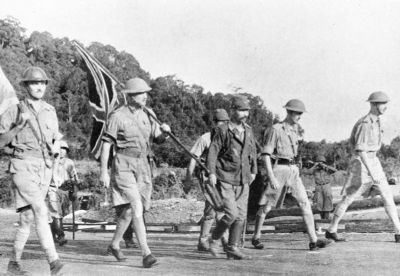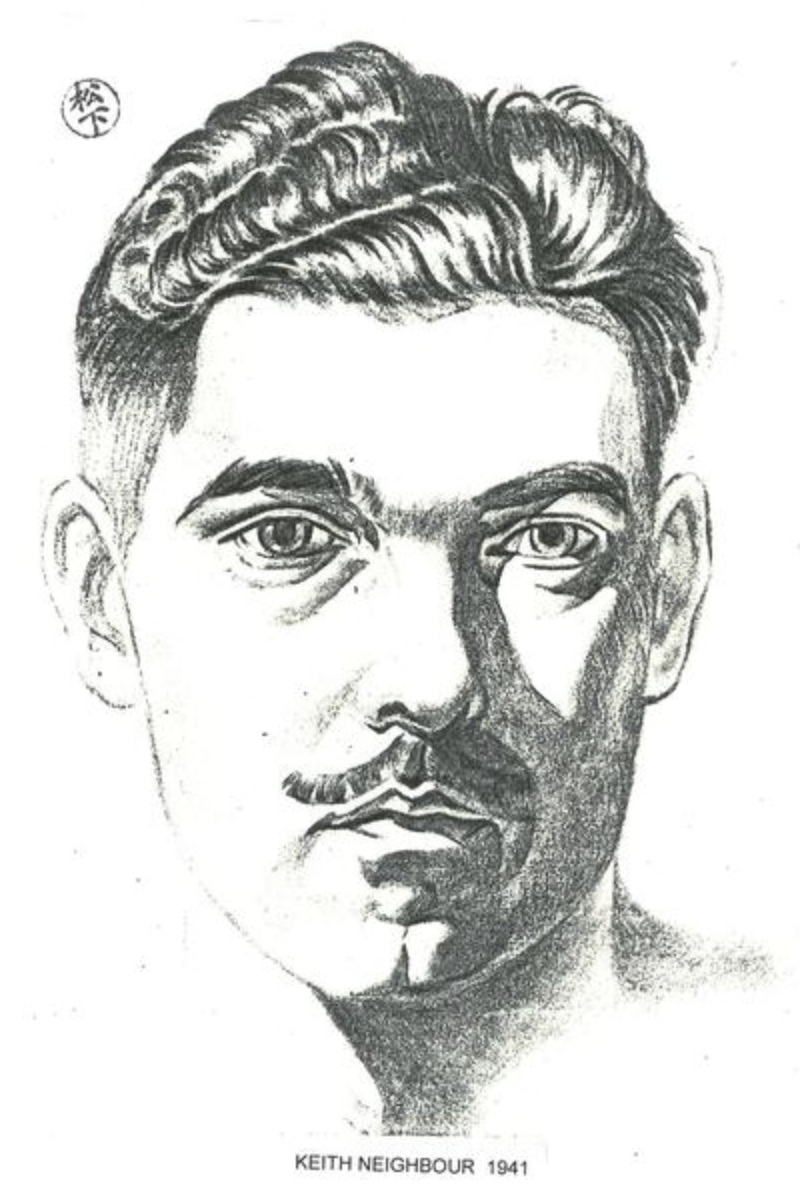Reliving Life in Goolwa in January 1942

Goolwa goes to war again 1939-1945
The rapid advance of Japanese forces in the Philippines as they push US forces into siege on the Bataan Peninsula has brought doubt as to whether General McArthur’s troops could hold the peninsula unless President Roosevelt can give major support to enable them to withstand further attack.
On the Malayan Peninsula, British Commonwealth and Australian forces have been pushed down to the point where they have now withdrawn from the peninsula and moved into Singapore. The city is now being heavily attacked by Japanese bombers.
Sergeant Keith Neighbour, (shown on right), now with 1 Squadron equipped with Lockheed Hudson bombers, had been sent to Kota Bharu to evacuate the squadron’s personnel before their base was overrun. From Kota Bharu the squadron was to fly on to an airfield in Sumatra, but in flight they were advised that the Japanese had already taken it. Flying on, the squadron were able to reach an airfield in Java where it was put under Dutch control and a garrison was posted to defend it.
Enemy troops have landed in Borneo and the Dutch East Indies. To the west of Malaya, the Japanese have taken the seaport of Moulamein in Burma and are moving on Rangoon.
In the Pacific, the Japanese forces have landed on the Solomon Islands, and New Britain where the battle for Rabaul is in progress. They are now however facing battle with US marines who have landed in Samoa, being a part of a strategy to stop the spread of Japanese forces in the Pacific.
2/3rd Machine Gun Battalion
In Syria, the 2/3rd Machine Gun Battalion had successfully taken part in the short Lebanon-Syria campaign which has ended with an armistice negotiated between the British forces command and the Vichy French administration. During the past months, Australian forces involved in the campaign had been involved in garrison duties which provides a challenge to any German intrusion from the north through Turkey.
During this tour of duty, the Goolwa members of the 2/3rd Battalion, Privates Tommy Atkins, Arthur Westley, and Arthur Taylor were able to have contact with Goolwa members of 2/10th Battalion of the 18th Brigade during the time they were posted to garrison duties in Aleppo near the northern Syrian border with Turkey.
Late in the month the 2/10th received orders that they, and indeed most, of the Australian forces in the Middle East will begin immediately to be recalled to Australia on the orders of Prime Minister John Curtin. The 2/3rd Battalion has also been ordered to be packed and ready to embark by the end of the month.
Civil Defence at home
The Air Raid Precautions (ARP) local officers have been instructed to step up black-out regulations in Goolwa, and although all houses in the town are more than a mile from the sea, they all come under the regulations regarding this issue. Cr Arnold Minns, Chief ARP warden, has been instructed to inform all Goolwa residents whose windows are visible from the seashore that they must keep their blinds drawn at night to make their internal lighting invisible from both sea and air. Everyone concerned must comply with the regulations and be warned that no further warnings will be given without penalty. The regulations also state that all other openings must be screened in such a manner that no interior light rays are visible from a greater distance than one hundred feet. The Goolwa ARP officers will start light patrols from the 4th of next month.
Light patrols are only required done periodically at night from that date, usually twice a week between the hours of 8.30pm and 1.00am, to ensure that households and businesses are complying with the blackout regulations. In addition to patrols, volunteers are now attending regular ARP training sessions in the Institute Hall taking part in first aid, learning how to deal with incendiary devices and the use of stirrup pump units to fight fires in buildings and associated damage control issues.
Other civil protection and safety needs had to be looked at also. The greatest of these were the protection of children attending the school. This fell to the newly appointed locum tenens head teacher, Eric Gann. Prior to him taking over the school on January 27th, he absorbed departmental recommendations early in the month and called on the chairman of the school committee, Arnold Minns to discuss the Education Department’s directives on air raid protection for all children and staff. Drills and instruction of students in air raid procedures would be the responsibility of Eric and his staff, but he would require manual help in providing air raid shelters in the school yard. The school committee responded quickly and has since met to plan for what is needed to be put in place.
Maintaining essential production
Recently, the Minister for the Army has stated that men who have been granted leave from compulsory military training units for the purpose of harvest operations, and those whose training had previously been deferred for essential work in connection with timber, flax, textile and the colliery industries would be rendering the utmost service to the war effort by remaining at their civilian occupations until, and unless called for.
At Midnight on December 31, clocks throughout Australia were put forward one hour to comply with the executive order issued by the Commonwealth government. This directive is designed as a method of conserving fuel for lighting purposes. However, while it was not met enthusiastically by members of the rural community who work by the sun rather than the clock, most welcomed the move for the objectives stated, and saw social benefits as well.
Dust storms hit Goolwa
The people of Goolwa were subjected in the middle of the month to the worst hot northerly gales in the memory of the town. The dust in the air was so thick that visibility at periods during the storm was down to less than two hundred feet. Daylight at times made the interior of homes and business premises require lights to be switched on (when power was available) or lamps lit. The dust was sucked up from the dry country to the north, now bare and drifting.
There was considerable property damage when homes and other buildings lost their roof coverings. Flying roof iron sheets sliced through power and telephone lines around town, while falling branches and trees fell over lines around the district feeding those utilities into the rural communities.
Amongst the fleet of small boats anchored on the river which dragged their moorings, some more than two miles. One boat was driven by the gale as it dragged its heavy mooring until it was forced against the barrage and sank there. Fortunately, it has been raised and is now on the slip being repaired.
The river cruiser Carina owned by Bill Bland, was dragging its mooring in the gale. The 30-ton vessel was blown a mile across the river before it grounded on a soft mud bank. Bill had brought the vessel from Port Adelaide in September last year, with Arty Sweetman and Jack Stewart piloting it through the Murray Mouth. The gale had caused the river level drop by three feet, so that as the winds calmed down the river level was restored to its pool level, it lifted the Carina off the mud bank.
P.S. Oscar W renews Point McLeay trips
As Captain Dave Ritchie blew the whistle of the PS Oscar W when it left the Goolwa wharf on Friday 10th, he was setting out on the first tourist trip from Goolwa to the Pt McLeay Mission Station for years. This was a firm favourite in the past with tourists and was supported by the South Australian Railways with excursion trains to and from the city as a train and steamer package tour, usually on Fridays, throughout the season. Captain Ritchie believes that the strict wartime petrol rationing will turn more people back to steam travel by rail and riverboat for their holiday trips.
Dave’s brother, Captain Jack Ritchie has just purchased the Oscar for 350 Pounds from Murray Shipping Ltd., under the agreement that it cannot be operated, except for procuring fuel, above Swan Reach. So, this trip to Point McLeay will be the first opportunity to try the steamer out with a maximum load of passengers on a full day trip.
Roadside charcoal filling points
Growing numbers of gas producers fitted on vehicles are becoming one of the most prevalent causes of bush fire this summer. While these attachments are useful aids in saving petrol, fuel saving is their only reason the owners of the units tolerate them. A mixture of carbon monoxide and nitrogen gas is generated from burning charcoal in the unit’s firebox, and by blowing a stream of air over the blazing coals, the gas produced is then sucked through a filter into the engine to propel it.
Dirty black dust clogged the filters requiring constant cleaning. At the same time sooty ash would be raked out of the firebox to be dumped on the ground. The hopper would then be refilled with fresh charcoal and relit ready to continue along to the next regular clearing spot.
Charcoal filling areas, cleared of flammable vegetation, were provided by Councils at intervals along the main roads. At the District Council of Pt Elliot meeting of January 1942, it was decided to establish a charcoal servicing area at Double Bridges. However, this site proved to be a hazard as others had, as burning material from gas producers were being discarded onto cleared open ground still live, but the possibility exists that wind stir could cause a live coal to blow into a verge and ignite. Responding later, as the Councils saw the risk of fire had to be guarded against, they are now providing open 44-gallon drums into which drivers, by law, must deposit discarded ash.
Local kids get behind the war effort
At the January Council meeting, District Clerk Reg Bristow-Smith reported to the Councillors that he has disposed of old surplus Council records and papers. Girl Guides and Boy Scouts were combing the district for scrap, rubber, cardboard, and paper for the war effort. Reg responded to their requests by sorting through an immense amount of old correspondence, catalogues and records going back through the life of the district Council and including material from the old former Goolwa Corporation Town Council, which ceased to exist in 1932. When he had a great pile of paper waste ready, he next checked with the State Libraries Board into the material’s disposal. Finally, he was able to clear his cluttered tiny office, allowing the Guides and Scouts to gather their pile to haul it up to the Goolwa School’s spare shed space to be stored and packed ready for collection.
It appears you only have to be five years old to join the war effort as Goolwa goes to war again.